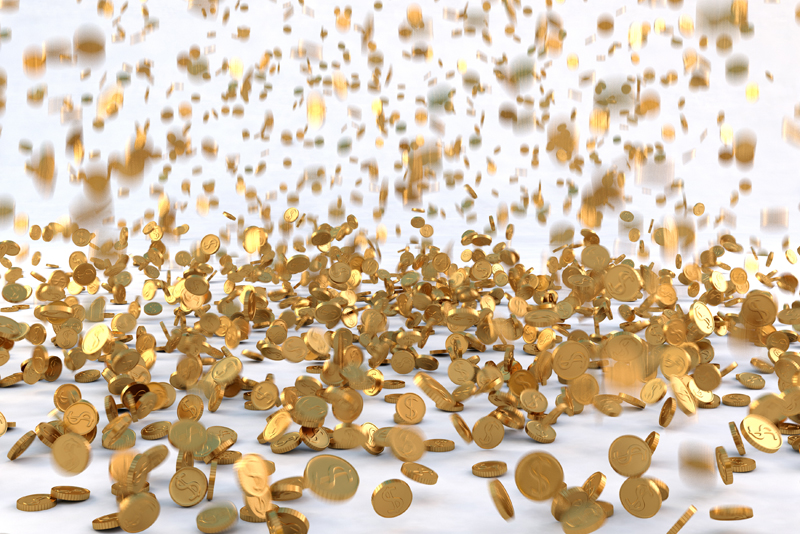Tax Could Send Collecting Underground

Coin dealers in India are reeling as the nation prepares to replace a one percent Value Added Tax on collector coins with a whopping 12 percent Goods and Services Tax. This tax is particularly problematic for the six or seven major numismatic firms in India that are registered with the Archaeological Survey of India.
Each of these dealers sell exclusively utilizing electronic payments and checks, each of which create traceable transaction for tax purposed. There are of course many smaller coin dealers who buy and sell exclusively in cash. The major concern is that the new tax will drive the entire coin business underground to avoid detection.
Tax rates levied on the purchase of antique gold and silver coins were always similar to that levied on bullion. Up to now, buyers paid one percent on each purchase. Now however, a separate category has been created which puts numismatics in the 12 percent tax bracket. Bullion, meanwhile will, will attract four to five percent under GST.
The bulk of gold and silver coins barely sell for two to three percent over the bullion rate. If buyers leave the coin market owing to this new tax, sellers will be forced to melt their old coins to extract at least the value of gold, or they will be forced to smuggle them abroad where taxes are low or nonexistent.
Or people will simply deal in cash to avoid excessive taxation. The coin dealing business could be forced underground in India to survive. None of this fits with the current government’s insistence on cashless payment and transparency.
Numismatics is vital to protecting and promoting Indian culture and heritage. Small kings and principalities who have been forgotten by history books are only remembered by the coins they minted. Even children and college students love collecting coins. History is also a hobby.
There are many local artisans who scrap older coins to make an Indian anklet called a payal. Melting older coins is clearly a real danger. The World Gold Council has tried to put a positive spin on the situation. In a recent article the Council indicated that higher taxes act as a head wind to gold demand. The tax should also change the industry to benefit the consumer.
The Gold Council believes the GST may be disruptive in the short term as the industry adjusts to the new tax regime. The Council see’s the net impact of the new tax as being positive.
The GST will bring greater transparency to the supply chain. However, if the numismatic and jewelry industries go underground, the idea of transparency is going to be moot.
Each of these dealers sell exclusively utilizing electronic payments and checks, each of which create traceable transaction for tax purposed. There are of course many smaller coin dealers who buy and sell exclusively in cash. The major concern is that the new tax will drive the entire coin business underground to avoid detection.
Tax rates levied on the purchase of antique gold and silver coins were always similar to that levied on bullion. Up to now, buyers paid one percent on each purchase. Now however, a separate category has been created which puts numismatics in the 12 percent tax bracket. Bullion, meanwhile will, will attract four to five percent under GST.
The bulk of gold and silver coins barely sell for two to three percent over the bullion rate. If buyers leave the coin market owing to this new tax, sellers will be forced to melt their old coins to extract at least the value of gold, or they will be forced to smuggle them abroad where taxes are low or nonexistent.
Or people will simply deal in cash to avoid excessive taxation. The coin dealing business could be forced underground in India to survive. None of this fits with the current government’s insistence on cashless payment and transparency.
Numismatics is vital to protecting and promoting Indian culture and heritage. Small kings and principalities who have been forgotten by history books are only remembered by the coins they minted. Even children and college students love collecting coins. History is also a hobby.
There are many local artisans who scrap older coins to make an Indian anklet called a payal. Melting older coins is clearly a real danger. The World Gold Council has tried to put a positive spin on the situation. In a recent article the Council indicated that higher taxes act as a head wind to gold demand. The tax should also change the industry to benefit the consumer.
The Gold Council believes the GST may be disruptive in the short term as the industry adjusts to the new tax regime. The Council see’s the net impact of the new tax as being positive.
The GST will bring greater transparency to the supply chain. However, if the numismatic and jewelry industries go underground, the idea of transparency is going to be moot.

Related Articles
Editor's Picks Articles
Top Ten Articles
Previous Features
Site Map
Content copyright © 2023 by Gary Eggleston. All rights reserved.
This content was written by Gary Eggleston. If you wish to use this content in any manner, you need written permission. Contact Gary Eggleston for details.


